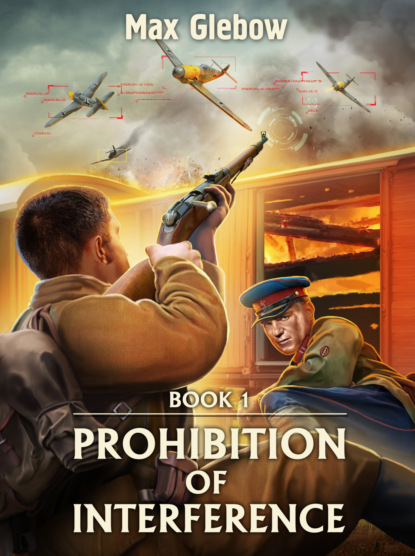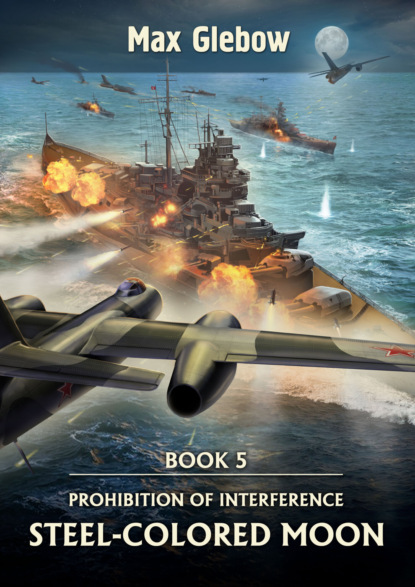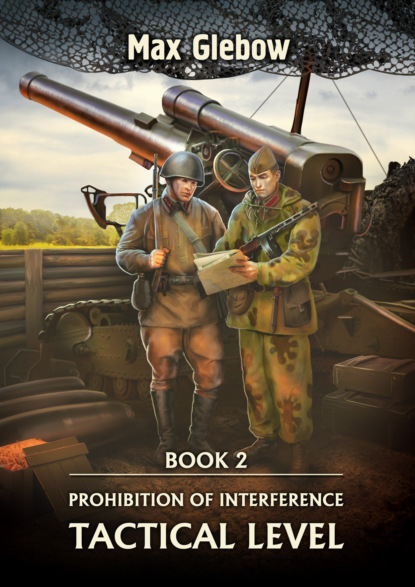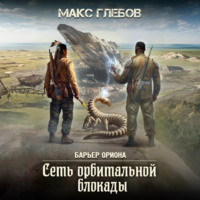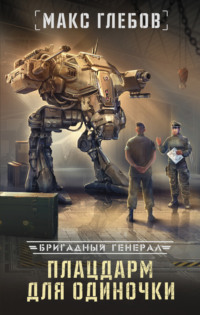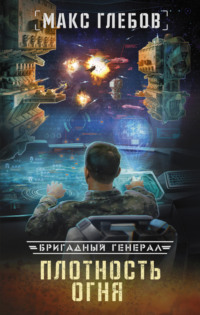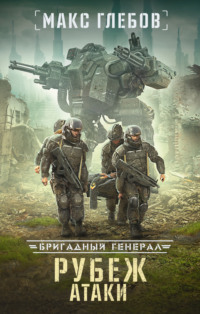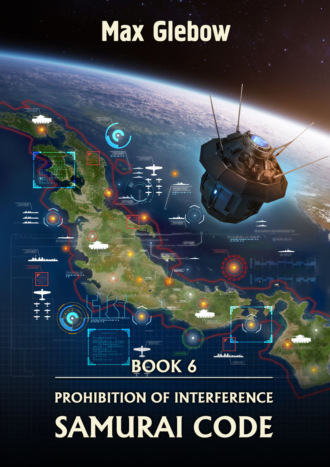
Полная версия
Prohibition of Interference. Book 6. Samurai Code
“They won't. Chennault coordinated his actions with Kudryavtsev through Chiang Kai-shek headquarters.”
Lebedev's radio operator fell into the grass next to me.
“Comrade Commander! General Kudryavtsev is on the line. Requesting targets for American allies.”
“Give it to me!” My face breaks into a predatory smile. “General, it's Nagulin!”
“Comrade Commander, the Americans are asking for targets.”
“Have them block the approaches from the northeast. I expect transport planes with Japanese paratroopers escorted by fighters from there. Bombers may come from there as well. The Japanese are preparing a big landing operation, and this is the start of it. Let the Allies deal with them. All we need here is paratroopers, we are hardly waving off local enthusiasts.”
“Copy that,” Kudryavtsev answers and hangs up, while I turn my gaze to the radio operator.
“Ivan, can you contact the ILs? We need to aim them at ground targets before the new fighters come in. It seems they've already dispersed the previous ones.”
No matter how strong in spirit the Japanese may be, there is a limit to everyone's toughness. The fuel-air bombs and cannon rounds in the back force them stop their attack and begin a disorderly retreat. The road ahead is clear.
We have five more wounded, three of whom need to be carried. Now we are definitely a walking hospital, but we can't sit still. We descend the hill and walk along the riverbed. The ILs fly off in the direction of Chongqing to refuel and re-supply, but they're immediately replaced by another five. Thirty minutes later, an American P-40 Warhawk, pulling a tail of black smoke, flies low over us. A little to the side we see another damaged plane – the Allies are clearly not bored. I'll be sure to tell Mr. Roosevelt my sincere thanks for his timely assistance and fly to Kunming to visit the Tigers with my pilots. We're going to strengthen our brotherhood in battle.
“You have visitors,” I hear a slight chuckle in Letra's obviously cheerful voice.
I unfold the virtual map before my eyes and see several more friendly markings right along the squad's path. I didn't expect that! We are still walking along the bank of the river, and about seven kilometers upstream four large motorboats of the strangest kind are moving toward us. I don't even know what to call these structures, but apparently here THIS is considered a combat boat. One can even see machine guns on the bow ends.
“It's the Chinese,” Letra explains. “Chiang Kai-shek's Special Forces are rushing to the aid of their allies.”
* * *Lieutenant Commander Hirch took his eyes off the tactical hologram playing a recording of the recent battle. All nine mini-drones, which the automatic reconnaissance ship had released into orbit on the savage planet, had gathered over the coast of the East China Sea, so the battle could be seen in great detail.
“Does anyone else have doubts?” Hirch looked around at the officers of the destroyer.
“Not in the slightest,” the deputy armament officer said for everyone. “Only a fighter with bio-implants and a direct link to the orbital grouping can fire primitive hand-held weapons so effectively at targets that move quickly and are often completely covered by foliage. It's impossible for wild ones to do that in principle.”
“And he's the only one there, that's obvious too,” the senior engineer added.
“Lieutenant Cree, are your men ready?” Hirsch turned to the landing section commander.
“They're ready, Commander, just waiting for an order.”
“Command, Lieutenant. It is entirely up to you to develop a plan to take over the subject. Drones in orbit will work exclusively for the benefit of your squad. You must leave the destroyer immediately after we exit out of jump at the edge of the outer asteroid belt. The ship, after jettisoning the dropship, will move deeper into space and return to the boundary of the system only to pick you up after completing the mission.”
“Permission to perform!”
“Granted,” Hirch nodded and turned to the first pilot. “Is the jump calculation ready?”
“We can start accelerating, commander.”
“Let's do it. It's time to be clear about what's going on here.”
Chapter 5
“Comrade Stalin, the enemy used new tanks on the Leningrad front,” Marshal Zhukov decided to begin his report with the most alarming news. “The Germans managed to surprise us unpleasantly. These heavy machines didn't go forward. They took up positions on the slopes of the heights about a kilometer from our trenches and supported their lighter tanks and infantry. Neither 45-mm nor 57-mm ZIS-2 or T-34 tank guns could hit them from such a distance, but they would pierce the armor of our tanks without any problems. The enemy attack could only be stopped by massive use of assault aviation, but the Germans still broke through the first line of defense.”
“What else is known about these tanks?” Stalin looked hard at the Marshal.
“At the most approximate estimate, they weigh more than 50 tons. The thickness of the armor in the frontal part of the hull is hardly less than one hundred millimeters, otherwise the Germans would not behave so brazenly. The caliber of the gun is about 90 millimeters. Most likely it is an upgraded version of the 88mm anti-aircraft gun. The running performance is comparable to the Panzer IV, although their maneuverability is probably worse.”
“How many tanks were there?”
“Four tanks. I think that's just the beginning. Comrade Commander-in-Chief, the troops urgently need effective means to combat the enemy's new equipment. We expected the Germans to do something to counterbalance our KVs and T-34s, but we still couldn't assume that. Perhaps the 85mm anti-aircraft guns could handle their armor, but that is a last resort – they are always in short supply for anti-aircraft defense as it is.”
“Comrade Zhukov, brief Comrades Morozov and Ustinov with this information. We'll come back to this matter again tonight, but in the meantime, continue your report. I am interested in the preparations for the attack on Kiev.”
* * *We moved farther and farther west. For all the questionable combat effectiveness of the Chinese riverboats, the help of Chiang Kai-shek's men came in handy. We were placed on the decks, and the wounded were finally able to rest from the constant jolting. In addition, they were immediately examined by an elderly Chinese man who informed us that he was a field surgeon. This doctor spoke Russian, with a monstrous accent, but at least he was understandable. After giving the necessary care to the most difficult patients, he took over for me.
Конец ознакомительного фрагмента.
Текст предоставлен ООО «ЛитРес».
Прочитайте эту книгу целиком, купив полную легальную версию на ЛитРес.
Безопасно оплатить книгу можно банковской картой Visa, MasterCard, Maestro, со счета мобильного телефона, с платежного терминала, в салоне МТС или Связной, через PayPal, WebMoney, Яндекс.Деньги, QIWI Кошелек, бонусными картами или другим удобным Вам способом.
Примечания
1
In real history, on the night of August 9, 1942, Vice Admiral Mikawa's squadron of seven cruisers and one destroyer defeated a squadron of cruisers and destroyers of the United States and Australia, which outnumbered the Japanese, in the battle off Savo Island. Not a single Japanese ship was sunk. The Allies lost four heavy cruisers. Another cruiser and two destroyers sustained serious damage. 1,077 Australian and American sailors were killed. Japanese casualties were limited to 58 men. Three cruisers sustained moderate damage. This undoubted and striking victory, however, was not used by Vice-Admiral Mikawa to disrupt the landing of American troops on Guadalcanal Island, although all the conditions were in place to do so. The clearly erroneous decision not to continue the attack and to retreat was influenced by fears of being hit by aircraft from American aircraft carriers after sunrise.
Mikawa did not know that the enemy carrier formation had left the combat zone, having suffered serious losses in deck fighters, and did not take the opportunity to destroy Allied transport ships at anchorages off the coast of Guadalcanal with impunity. As a result, the Japanese missed their chance to fundamentally change the course of the battle for the Solomon Islands and New Guinea.


